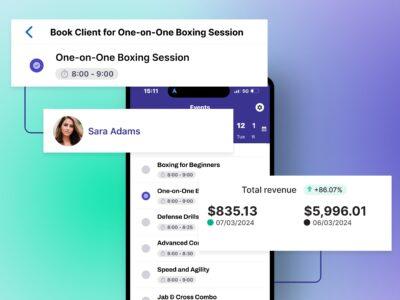Growing from one location to many is one of the most exciting—and challenging—phases of business expansion.
The jump from running a single studio to managing several locations brings the promise of new revenue opportunities and an expanded market presence. But it also creates operational challenges that can hurt your business if you’re not prepared.
The bottom line: Successful business expansion requires more than just opening new doors. You need strategic planning, scalable systems, and the right technology to maintain service quality while you grow efficiently.
This guide explores proven strategies that multi-location fitness operators use to expand—without losing the community feel and operational excellence that made their first location successful.
📝 Free Resource: The Fitness Studio Expansion Cheat Sheet
TL;DR: Scaling from one fitness location to multiple sites changes everything about how you operate. But with watertight processes, the right technology, and a strong financial foundation in place before you expand, you can grow without losing the community feel you’ve become known for. |
Why Expansion at Scale Is Different
Building a Scalable Foundation Before Expansion
Protecting Brand Consistency While Expanding
FAQs – Business Expansion for Gyms and Fitness Studios
Why Expansion at Scale Is Different
Business expansion refers to the strategic growth of a company through various methods such as opening new locations, entering new markets, or diversifying service offerings. But scaling from 1-2 locations to 5-10+ fundamentally changes everything about how you operate.
The critical shift in operations
When you operate a single gym location, you can personally oversee member experiences, staff performance, and daily operations. This hands-on approach becomes impossible as you expand.
Consider these key challenges:
- Maintaining the same member experience across multiple locations requires SOPs, training protocols, and quality control systems that simply weren’t necessary before.
- Instead of managing one team, you’re now coordinating across multiple locations, each with their own staff dynamics, local market conditions, and operational challenges.
- Without proper systems, tracking performance across locations becomes a nightmare of spreadsheets and fragmented data, which makes it difficult to identify which locations are thriving and which need support.
- One poorly managed location can damage your entire brand’s reputation in ways that affect all your sites.
Take Special Strong, an adaptive fitness franchise that serves individuals with special needs. Starting from just one location in 2016, they’ve since expanded to over 10 locations across 4 states.
When they decided to scale beyond their original location, they realized their manual processes wouldn’t scale. ABC Glofox helped streamline their operations, which allowed the team to enhance efficiency and improve customer service across all franchises.
“ABC Glofox offered the automation and customer support we needed to scale effectively,” shares founder Daniel Stein.
What may lead to expansion in the business cycle
Several factors typically drive fitness businesses to pursue business expansion:
→ The market is saturated at the current location, which has created consumer demand for more sites
→ They have a proven business model (consistent profitability and strong member retention)
→ They’ve built strong brand recognition in their local community
→ They’ve learned how to confidently manage operations through the success of their first location
→ They have access to capital through operating profit, investors, or financing
Smart operators recognize these signals and use them as a checklist, not rushing to expand until multiple indicators align.
📝 Read More: Fitness Studio Business Strategy – Grow, Scale & Succeed
Building a Scalable Foundation Before Expansion
The most successful multi-location operators invest heavily in systems and processes before opening their second location. This upfront investment pays dividends as they continue to scale.
Consideration #1: Standardize Business Processes Early
Standard Operating Procedures (SOPs) provide replicable, properly documented instructions that anyone in your business can follow. Put differently, they’re the operating manual for your business. For gyms and studios, you’ll want to focus on critical areas like:
Member onboarding
Create a step-by-step process for welcoming new members—from the initial consultation through their first month.
This should include standardized welcome packages and communication touchpoints, consistent methods for goal-setting and progress tracking, as well as uniform presentations for pricing and membership options.
📝 Read More: How to Simplify Member Onboarding With ABC Glofox
Staff training and certification
You’ll need to develop comprehensive training programs to ensure every team member delivers the same quality experience regardless of location.
Some ideas for modules to include:
- Your brand values and customer service standards
- Class instruction techniques and safety protocols
- Sales processes and member retention strategies
Daily operations
Document everything from opening/closing procedures to equipment maintenance schedules. For instance, having detailed operating manuals—either print or digital—helps your team deliver a consistent member experience across locations.

Consideration #2: Leverage Technology from Day One
Without integrated tech, you’ll quickly find yourself drowning in complex administrative tasks across multiple locations.
Tools for centralized member management
Get real-time visibility into your members’ activities across all locations. With member management software, you’ll be able to see member engagement patterns at a glance, or easily identify members who might be at risk of churning.
Another practical use case for this software is analyzing which programs and/or services perform best at each location so you can double-down on what works and fix what doesn’t.
📝 Check Out: Why User-Friendly Software is the Secret to Scaling Your Fitness Studio
Global payments and billing
Implement systems that handle recurring payments, automatic membership renewals, failed payments, and automated collections across all locations from a single dashboard.
Insightful 360-degree reporting
Gym management software makes it easier to collect and interpret valuable business data. Whether you need location-specific details or company-wide insights, you’ll get a quick view of what’s going on through an easy to understand dashboard.
Key Performance Indicators (KPIs) to keep an eye on:
- Member retention rates
- Class and instructor popularity
- Upcoming membership renewals
- Revenue per square foot
- Profit margin(s)
👉 ABC Glofox addresses each of these needs by providing centralized gym management tools that scale with your fitness business.
📝 Check Out: How ABC Glofox Uses Data to Boost Your Business Growth

Consideration #3: Make Data-Driven Financial Decisions
Running one successful fitness business is tough enough. Make sure you’ve mastered your numbers (like the ones listed below) before you expand. They’ll tell you if you’re ready to grow or if you need to strengthen what you’ve already built.
Monthly recurring revenue (MRR)
This is your predictable monthly income from memberships. Hold off on expansion if your MRR isn’t growing steadily for at least 6 months. You need stable cash flow before taking on another location’s rent and expenses.
Member churn rate
How many of your members cancel each month? If you’re losing more than 5% monthly, prioritize fixing this issue before expanding. Opening a new location won’t solve retention problems. Unfortunately, it’ll just give you twice as many members to lose.
Read More: How Glofox’s AI Can Mitigate Member Churn and Boost Retention
Gross profit margin
What percentage of revenue is left after paying instructors and your direct costs? You need at least 60% for a healthy fitness business. Lower margins than this mean your classes aren’t profitable enough to replicate elsewhere.
Customer acquisition cost (CAC)
Exactly how much does it cost to get one new member through your doors? This number often increases with new locations. If you don’t know your CAC down to the penny, you’re not ready to scale.
Check Out: Is Owning a Gym Profitable? Uncovering the Truth Behind Fitness Business Earnings
Net profit margin
Your actual profit after all expenses. Aim for at least 10% consistently. Without this cushion, unexpected expansion costs—and there are always unexpected costs—could sink your business.
Utilization rate
What percentage of your class spots and equipment time gets used? Below 70% means you have room to grow without expanding. Max out your current space before paying for more.
Average revenue per member (ARPM)
Total revenue divided by total members. Low ARPM means you’re not maximizing the value of your current members through personal training, retail, or add-on services. Get this right before trying to duplicate.
Break-even point
The exact number of members needed to cover all costs. Calculate this for your new location before signing anything. Can you realistically hit this number in 6 months? If you’re not sure, keep planning.
What it comes down to: Scaling won’t fix these numbers if they aren’t strong at your current location. Get your first location running smoothly, then use these metrics as your expansion readiness checklist.
Tracking these metrics manually through spreadsheets can eat up hours of your week—time you should spend growing your business. That’s where the right fitness management software makes all the difference. ABC Glofox’s reporting dashboard puts these critical numbers at your fingertips, updating in real-time so you always know where your business stands.
You’ll no longer have to guess if you’re ready to scale. You’ll have the data to prove it. 👍
Read More: Save Time and Money – How ABC Glofox Replaces 5 Tools with One Platform
Protecting Brand Consistency While Expanding
Your members fell in love with more than just your equipment. They joined a community with a specific vibe, values, and experience. Lose this in expansion, and you’ll lose what makes your business special.
Keep the member experience consistent
Every touchpoint matters—from how staff greet members to the music played in your classes. Document these details in your brand guidelines and/or SOPs. This ensures your members feel at home no matter which location they’re visiting.
Align your messaging everywhere
Your social media, email campaigns, and in-studio communications need to speak with one voice. Mixed messages confuse members and weaken your market position. Create content templates and approval processes that keep everyone on-brand.
Read More: 8 Best Fitness Communication Practices to Boost Member Retention
Choose your growth structure wisely
Corporate-owned locations give you direct control over quality and operations. Franchising can accelerate your growth but requires bulletproof systems to maintain service standards.
Neither is wrong—just know that franchising means accepting some variation in exchange for faster expansion.
Go Deeper: How to Open A Gym Franchise
FAQs – Business Expansion for Gyms and Studios
What are the three methods of expansion for fitness businesses?
Fitness businesses typically expand through:
- Opening new corporate-owned locations (keeping full control of operations);
- Franchising (letting others run locations under your brand); or
- Acquiring existing gyms in new markets.
Each path has different capital needs and growth speeds. Choose based on your resources and how hands-on you want to be.
Check Out: Joe Sanok on Knowing When to Scale Your Business to the Next Level
How do you successfully manage multiple fitness studio locations without losing service quality?
Start with rock-solid SOPs that document exactly how things should run. Train your staff consistently across all locations. Then use technology to keep tabs on what’s happening everywhere—member engagement, class attendance, revenue, etc.—without having to drive to different locations. Regular check-ins and member surveys help catch small issues before they become bigger problems.
How can technology help multi-location fitness operators grow at scale?
The right software is your business command center. You’ll get one dashboard that shows member activity, payments, and performance across all locations.
ABC Glofox helps do the heavy lifting by putting member management, billing, scheduling, and reporting in one place—so you spend less time on admin and more time growing your business.
Is franchising or corporate ownership better for fitness business expansion?
It depends on what you’re after. Corporate ownership gives you complete control; every location runs exactly how you want. But you’ll need more capital and management bandwidth to get started.
Franchising helps you grow faster with other people’s money, but you’ll have less control over day-to-day operations.
Most successful operators choose based on their available capital, desired growth timeline, and comfort level with giving up some control.
Client Success Story: Building a Boxing Studio Franchise with ABC Glofox – Spartans Boxing Club
Your Next Steps
Finally, with the right systems, processes, and technology in place, you can grow strategically while maintaining the member experience that set you apart in the first place.
ABC Glofox has helped hundreds of fitness operators scale successfully by providing the centralized management tools that make multi-location operations manageable.
Download our free Fitness Studio Expansion Cheat Sheet for a step-by-step guide to scaling your business the smart way!















